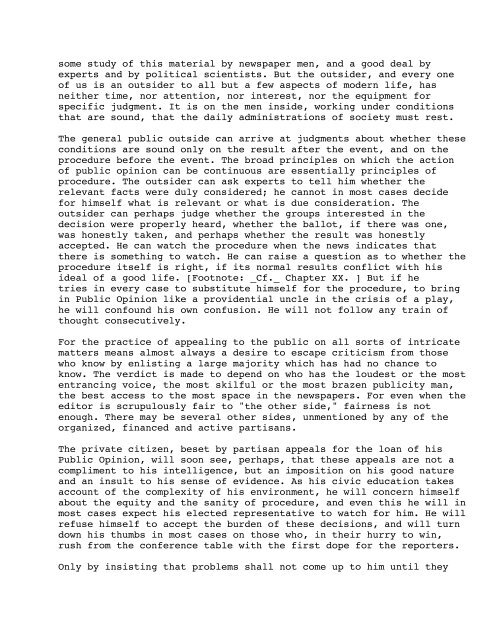PUBLIC OPINION by WALTER LIPPMANN TO FAYE LIPPMANN ...
PUBLIC OPINION by WALTER LIPPMANN TO FAYE LIPPMANN ...
PUBLIC OPINION by WALTER LIPPMANN TO FAYE LIPPMANN ...
Create successful ePaper yourself
Turn your PDF publications into a flip-book with our unique Google optimized e-Paper software.
some study of this material <strong>by</strong> newspaper men, and a good deal <strong>by</strong><br />
experts and <strong>by</strong> political scientists. But the outsider, and every one<br />
of us is an outsider to all but a few aspects of modern life, has<br />
neither time, nor attention, nor interest, nor the equipment for<br />
specific judgment. It is on the men inside, working under conditions<br />
that are sound, that the daily administrations of society must rest.<br />
The general public outside can arrive at judgments about whether these<br />
conditions are sound only on the result after the event, and on the<br />
procedure before the event. The broad principles on which the action<br />
of public opinion can be continuous are essentially principles of<br />
procedure. The outsider can ask experts to tell him whether the<br />
relevant facts were duly considered; he cannot in most cases decide<br />
for himself what is relevant or what is due consideration. The<br />
outsider can perhaps judge whether the groups interested in the<br />
decision were properly heard, whether the ballot, if there was one,<br />
was honestly taken, and perhaps whether the result was honestly<br />
accepted. He can watch the procedure when the news indicates that<br />
there is something to watch. He can raise a question as to whether the<br />
procedure itself is right, if its normal results conflict with his<br />
ideal of a good life. [Footnote: _Cf._ Chapter XX. ] But if he<br />
tries in every case to substitute himself for the procedure, to bring<br />
in Public Opinion like a providential uncle in the crisis of a play,<br />
he will confound his own confusion. He will not follow any train of<br />
thought consecutively.<br />
For the practice of appealing to the public on all sorts of intricate<br />
matters means almost always a desire to escape criticism from those<br />
who know <strong>by</strong> enlisting a large majority which has had no chance to<br />
know. The verdict is made to depend on who has the loudest or the most<br />
entrancing voice, the most skilful or the most brazen publicity man,<br />
the best access to the most space in the newspapers. For even when the<br />
editor is scrupulously fair to "the other side," fairness is not<br />
enough. There may be several other sides, unmentioned <strong>by</strong> any of the<br />
organized, financed and active partisans.<br />
The private citizen, beset <strong>by</strong> partisan appeals for the loan of his<br />
Public Opinion, will soon see, perhaps, that these appeals are not a<br />
compliment to his intelligence, but an imposition on his good nature<br />
and an insult to his sense of evidence. As his civic education takes<br />
account of the complexity of his environment, he will concern himself<br />
about the equity and the sanity of procedure, and even this he will in<br />
most cases expect his elected representative to watch for him. He will<br />
refuse himself to accept the burden of these decisions, and will turn<br />
down his thumbs in most cases on those who, in their hurry to win,<br />
rush from the conference table with the first dope for the reporters.<br />
Only <strong>by</strong> insisting that problems shall not come up to him until they





